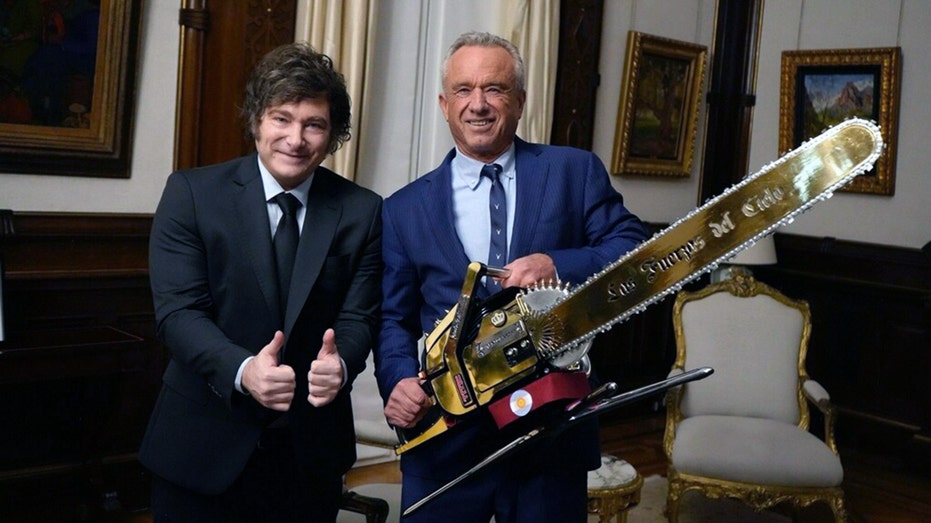Kennedy and Milei Reinforce Exit from WHO After Buenos Aires Meeting: Claiming Liberation from 'Totalitarian Control'
RFK Jr. and Argentina’s President Milei vow to break from WHO, aiming to establish a new health system rooted in science and sovereignty.

U.S. Health and Human Services Secretary Robert F. Kennedy Jr. met with Argentine President Javier Milei on Tuesday at the Casa Rosada, reaffirming both nations' intentions to withdraw from the World Health Organization (WHO) and pursue a new international health framework. The high-profile meeting underscored a growing alliance between two leaders known for challenging establishment policies and global institutions.
Milei, a libertarian economist and political outsider, has built his presidency around ambitious spending cuts and reforms aimed at reversing Argentina’s long-standing financial woes. Kennedy Jr., appointed under President Trump, has become a leading voice against pandemic-era mandates and global public health authorities. Together, they voiced plans to confront what they described as "global overreach" and "politicized health policy" by the WHO.
During Kennedy’s visit, Argentina made its departure from the WHO official, following Milei’s announcement earlier this year. This decision brings Argentina into alignment with President Trump’s renewed campaign promise to remove the U.S. from the organization as part of his "Make America Healthy Again" agenda.
Both leaders were sharply critical of the WHO’s handling of the COVID-19 pandemic. The Argentine government, in a statement, accused the agency of prioritizing political interests over scientific evidence, calling its approach to lockdowns a "caveman quarantine." Milei’s administration has repeatedly argued that the group’s policies failed to deliver meaningful protection during the health crisis.
Kennedy has lent vocal support to such criticisms in recent months, encouraging additional countries to follow suit and leave the WHO. He has claimed the organization is swayed by foreign governments and corporate interests, and advocated for a “fresh approach” to global health cooperation centered on transparency and independence.
After their meeting, Kennedy posted on social media: "I had a wonderful meeting with President Milei about the mutual withdrawal of our nations from the WHO and the creation of an alternative international health system... free from totalitarian impulses, corruption, and political control."
Officials from both governments say they plan to focus their new cooperation on three key pillars:
- Prioritizing scientific evidence in policy-making
- Respecting individual freedom and informed consent
- Defending national sovereignty in public health decisions
They characterized current global agencies as intrusive and politically motivated, signaling a broader pushback against what they view as interference in domestic affairs.
The meeting also showcased the philosophical overlap between Milei and Kennedy. Since assuming office, Milei has pursued sweeping austerity measures, cutting government salaries, suspending state projects, and rolling back subsidies. His policies have yielded rapid results, including Argentina’s first budget surplus in nearly fifteen years and a significant drop in monthly inflation rates.
In parallel, Kennedy’s MAHA approach has sought to pare down federal power in health matters, increase transparency, and reinforce evidence-based practices within the U.S. healthcare system.
Argentina’s alignment with Trump’s health agenda marks a notable shift in its international relationships. In recent months, Milei has welcomed a number of high-ranking U.S. officials, signaling intentions to deepen collaboration with Washington. As the first foreign leader to formally support the U.S. campaign to leave the WHO, Milei’s move could influence other nations weighing similar steps.
Yet, questions remain about the repercussions. Critics, including opposition figures in Argentina and many public health experts, warn that abandoning the WHO could endanger access to vital funding, technical advice, and life-saving vaccines. While even supporters concede the organization’s COVID response was imperfect, most defend its central role in managing global health crises.
Despite these concerns, Argentina’s health minister celebrated the meeting as evidence of a shared commitment to reform and transparency. Both governments maintain that their new alliance will drive authentic accountability and reset priorities in the global health system.
The U.S. Department of Health and Human Services did not immediately issue a comment on the high-profile meeting or the ongoing plans for withdrawal from the WHO.




